5 books by Gillman, Susan
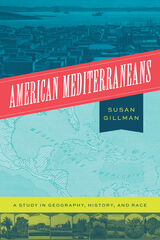
American Mediterraneans
A Study in Geography, History, and Race
Susan Gillman
University of Chicago Press, 2022
The story of the “American Mediterranean,” both an idea and a shorthand popularized by geographers, historians, novelists, and travel writers from the early nineteenth century to the 1970s.
The naturalist Alexander von Humboldt, visiting the Gulf-Caribbean in the early nineteenth century, called it America’s Mediterranean. Almost a century later, Southern California was hailed as “Our Mediterranean, Our Italy!” Although “American Mediterranean” is not a household phrase in the United States today, it once circulated widely in French, Spanish, and English as a term of art and folk idiom. In this book, Susan Gillman asks what cultural work is done by this kind of unsystematic, open-ended comparative thinking.
American Mediterraneans tracks two centuries of this geohistorical concept, from Humboldt in the early 1800s, to writers of the 1890s reflecting on the Pacific world of the California coast, to writers of the 1930s and 40s speculating on the political past and future of the Caribbean. Following the term through its travels across disciplines and borders, American Mediterraneans reveals a little-known racialized history, one that paradoxically appealed to a range of race-neutral ideas and ideals.
The naturalist Alexander von Humboldt, visiting the Gulf-Caribbean in the early nineteenth century, called it America’s Mediterranean. Almost a century later, Southern California was hailed as “Our Mediterranean, Our Italy!” Although “American Mediterranean” is not a household phrase in the United States today, it once circulated widely in French, Spanish, and English as a term of art and folk idiom. In this book, Susan Gillman asks what cultural work is done by this kind of unsystematic, open-ended comparative thinking.
American Mediterraneans tracks two centuries of this geohistorical concept, from Humboldt in the early 1800s, to writers of the 1890s reflecting on the Pacific world of the California coast, to writers of the 1930s and 40s speculating on the political past and future of the Caribbean. Following the term through its travels across disciplines and borders, American Mediterraneans reveals a little-known racialized history, one that paradoxically appealed to a range of race-neutral ideas and ideals.
[more]
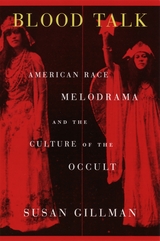
Blood Talk
American Race Melodrama and the Culture of the Occult
Susan Gillman
University of Chicago Press, 2003
The United States has seldom known a period of greater social and cultural volatility, especially in terms of race relations, than the years from the end of Reconstruction to the First World War. In this highly original study, Susan Gillman explores the rise during this period of a remarkable genre—the race melodrama—and the way in which it converged with literary trends, popular history, fringe movements, and mainstream interest in supernatural phenomena.
Blood Talk shows how race melodrama emerged from abolitionist works such as Uncle Tom's Cabin and surprisingly manifested itself in a set of more aesthetically and politically varied works, such as historical romances, sentimental novels, the travel literature of Mark Twain, the regional fiction of Kate Chopin and George Washington Cable, and the work of W. E. B. Du Bois. Gillman then uses the race melodrama to show how racial discourses in the United States have been entangled with occultist phenomena, from the rituals of the Ku Klux Klan and the concept of messianic second-sight to the production of conspiracy theories and studies of dreams and trances.
Blood Talk shows how race melodrama emerged from abolitionist works such as Uncle Tom's Cabin and surprisingly manifested itself in a set of more aesthetically and politically varied works, such as historical romances, sentimental novels, the travel literature of Mark Twain, the regional fiction of Kate Chopin and George Washington Cable, and the work of W. E. B. Du Bois. Gillman then uses the race melodrama to show how racial discourses in the United States have been entangled with occultist phenomena, from the rituals of the Ku Klux Klan and the concept of messianic second-sight to the production of conspiracy theories and studies of dreams and trances.
[more]
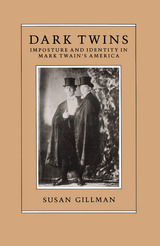
Dark Twins
Imposture and Identity in Mark Twain's America
Susan Gillman
University of Chicago Press, 1989
"Many persons have such a horror of being taken in," wrote P. T. Barnum, "that they believe themselves to be a sham and are continually humbugging themselves." Mark Twain enjoyed trading on that horror, as the many confidence men, assumed identities, and disguised characters in his fiction attest. In Dark Twins, Susan Gillman challenges the widely held assumption that Twain's concern with identity is purely biographical and argues that what has been regarded as a problem of individual psychology must be located instead within American society around the turn of the century. Drawing on Twain's whole writing career, but focusing on the controversial late period of social "pessimism" and literary "incoherence," Gillman situates Twain and his work in historical context, demonstrating the complex interplay between his most intimate personal and authorial identity and the public attitudes toward race, gender, and science.
Gillman shows that laws regulating race classification, paternity, and rape cases underwrite Twain's critical exploration of racial and sexual difference in the writings of the 1890s and after, most strikingly in the little-known manuscripts that Gillman calls the "tales of transvestism." The "pseudoscience" of spiritualism and the "science" of psychology provide the cultural vocabularies essential to Twain's fantasy and science fiction writings of his last two decades. Twain stands forth finally as a representative man, not only a child of his culture, but also as one implicated in a continuing American anxiety about freedom, race, and identity.
Gillman shows that laws regulating race classification, paternity, and rape cases underwrite Twain's critical exploration of racial and sexual difference in the writings of the 1890s and after, most strikingly in the little-known manuscripts that Gillman calls the "tales of transvestism." The "pseudoscience" of spiritualism and the "science" of psychology provide the cultural vocabularies essential to Twain's fantasy and science fiction writings of his last two decades. Twain stands forth finally as a representative man, not only a child of his culture, but also as one implicated in a continuing American anxiety about freedom, race, and identity.
[more]
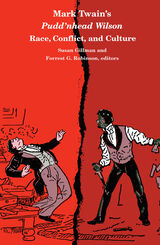
Mark Twain's Pudd'nhead Wilson
Race, Conflict and Culture
Susan Gillman and Forrest Robinson, eds.
Duke University Press, 1990
This collection seeks to place Pudd’nhead Wilson—a neglected, textually fragmented work of Mark Twain’s—in the context of contemporary critical approaches to literary studies. The editors’ introduction argues the virtues of using Pudd’nhead Wilson as a teaching text, a case study in many of the issues presently occupying literary criticism: issues of history and the uses of history, of canon formation, of textual problematics, and finally of race, class, and gender.
In a variety of ways the essays build arguments out of, not in spite of, the anomalies, inconsistencies, and dead ends in the text itself. Such wrinkles and gaps, the authors find, are the symptoms of an inconclusive, even evasive, but culturally illuminating struggle to confront and resolve difficult questions bearing on race and sex. Such fresh, intellectually enriching perspectives on the novel arise directly from the broad-based interdisciplinary foundations provided by the participating scholars. Drawing on a wide variety of critical methodologies, the essays place the novel in ways that illuminate the world in which it was produced and that further promise to stimulate further study.
In a variety of ways the essays build arguments out of, not in spite of, the anomalies, inconsistencies, and dead ends in the text itself. Such wrinkles and gaps, the authors find, are the symptoms of an inconclusive, even evasive, but culturally illuminating struggle to confront and resolve difficult questions bearing on race and sex. Such fresh, intellectually enriching perspectives on the novel arise directly from the broad-based interdisciplinary foundations provided by the participating scholars. Drawing on a wide variety of critical methodologies, the essays place the novel in ways that illuminate the world in which it was produced and that further promise to stimulate further study.
Contributors. Michael Cowan, James M. Cox, Susan Gillman, Myra Jehlen, Wilson Carey McWilliams, George E. Marcus, Carolyn Porter, Forrest Robinson, Michael Rogin, John Carlos Rowe, John Schaar, Eric Sundquist
[more]
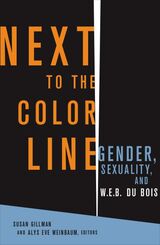
Next to the Color Line
Gender, Sexuality, and W. E. B. Du Bois
Susan Gillman
University of Minnesota Press, 2007
Although W. E. B. Du Bois did not often pursue the connections between the “Negro question” that defined so much of his intellectual life and the “woman question” that engaged writers and feminist activists around him, Next to the Color Line argues that within Du Bois’s work is a politics of juxtaposition that connects race, gender, sexuality, and justice.This provocative collection investigates a set of political formulations and rhetorical strategies by which Du Bois approached, used, and repressed issues of gender and sexuality. The essays in Next to the Color Line propose a return to Du Bois, not only to reassess his politics but also to demonstrate his relevance for today’s scholarly and political concerns.Contributors: Hazel V. Carby, Yale U; Vilashini Cooppan, U of California, Santa Cruz; Brent Hayes Edwards, Rutgers U; Michele Elam, Stanford U; Roderick A. Ferguson, U of Minnesota; Joy James, Williams College; Fred Moten, U of Southern California; Shawn Michelle Smith, St. Louis U; Mason Stokes, Skidmore College; Claudia Tate, Princeton U; Paul C. Taylor, Temple U.Susan Gillman is professor of literature at the University of California, Santa Cruz. Alys Eve Weinbaum is associate professor of English at the University of Washington, Seattle.
[more]
READERS
Browse our collection.
PUBLISHERS
See BiblioVault's publisher services.
STUDENT SERVICES
Files for college accessibility offices.
UChicago Accessibility Resources
home | accessibility | search | about | contact us
BiblioVault ® 2001 - 2024
The University of Chicago Press









